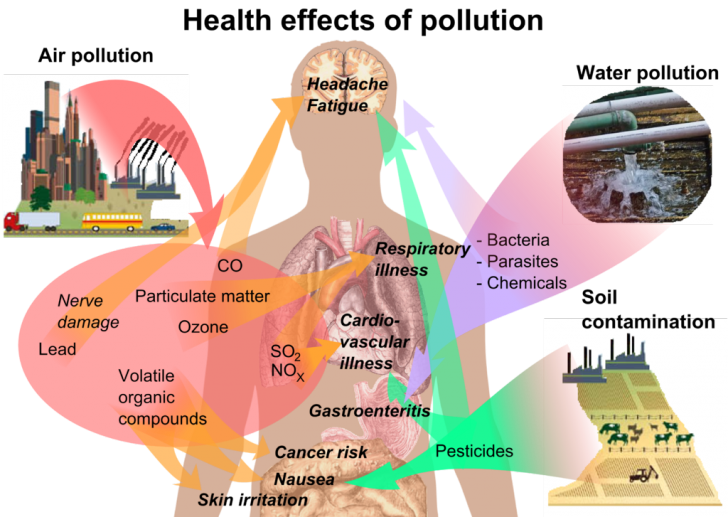Air pollution is the introduction of harmful and unwanted substances like auto emissions, dust and gases, suspended particles, chemicals etc. into the air around us.
Various anthropogenic(chiefly of environmental pollution and pollutants originating in human activity.) and even some natural causes contribute to the mixing of these substances in the atmosphere. Air pollution has become a severe threat to our natural ecosystems and biodiversity in the environment. Both indoor and outdoor pollution of air adversely affects the health and well-being of all living beings.
These effects include:
Effects on human health
Pollution of indoor and outdoor environments is a major problem to human health. WHO estimated in 2012 that air pollution claimed the lives of almost 3.7 million people around the world in a year.

Effects of Particulate Matter
Particulate matter measuring 10 microns (PM10) and harmful ozone found in the lower atmosphere hampers the respiratory as well as cardiovascular systems.
PM2.5 and harmful ozone are also associated with irritation of eyes, throat and nose, difficulty in breathing, asthma, allergies and chronic obstructive pulmonary disease.
Effects due to Exposure to Gases
Over exposure to gases like ozone, sulfur dioxide, nitrogen dioxide and carbon monoxide play a role in increased chances of lung inflammation, asthma, decrease in lung function and emphysema among others.
Effects of Indoor Pollution
People of least developed and developing nations are at a greater risk of health deterioration from indoor pollution due to burning of fuels for cooking and heating purposes.
Impact on the central nervous system
Adverse effects of air pollution on the central nervous system are also being researched. A research conducted in 2014 by the University Of Rochester Medical Center suggested that pollution of air can affect some brain functions like short-term memory, impulsivity and learning.

Effects on the environment
Effects of Harmful Ozone
The ozone found near our earth surface is harmful to us, in contrast to the ozone found higher up in the atmosphere which is a protective layer against ultraviolet rays. Harmful ozone has significant negative effects on the productivity of vegetation.
Effects of Particulate Matter
The effects of particulate matter on plants depend upon their size and chemical constituents. Particulate matters bring change in the chemistry of soil which can lead to changes in productivity and plant growth. They can also damage the plants physically through abrasion.
Acid Rain
Oxides of nitrogen and sulfur oxide are responsible for corrosion of materials. When they mix with ammonia in the atmosphere, acid rain occurs. Acid rain has significant damaging effects on vegetation and soil as well as buildings.
Eutrophication
Eutrophication is the process in nature of enhancing ecosystem with chemical compound especially nitrogen and phosphorous. But nitrogen oxides emitted from power plants and automobiles contribute to the increase in the nitrogen in aquatic ecosystems. The high concentrations of nitrogen stimulate the growth of algae in water bodies which may harm the survival of fishes and other aquatic life. Human activities are accelerating this process greatly.
Depletion of Good Ozone
The protective layer of ozone found in the upper atmosphere is being depleted by pollutants such as Chlorofluorocarbons(CFC), Halons and Hydrochlorofluorocarbons(HCFC) that are emitted into the atmosphere from pesticides, coolants, refrigerators etc.
Historical Effects of Air Pollution
- The Bhopal Disaster that occurred in India on December 1984 is considered to be the most devastating industrial disaster in the world. After exposure to leaked gases from a pesticide industry, over 3000 local people lost their lives.
- In December 1952, the United Kingdom faced its worst event of air pollution when a thick smog covered London. The Great Smog lasted for four days and majorly disrupted visibility. It claimed the lives of almost 4000 people and 100,000 suffered from respiratory problems because of the smog.
- In 1979, anthrax spores were leaked accidentally from a laboratory located nearby Sverdlovsk in the then USSR which led to death of 64 people.